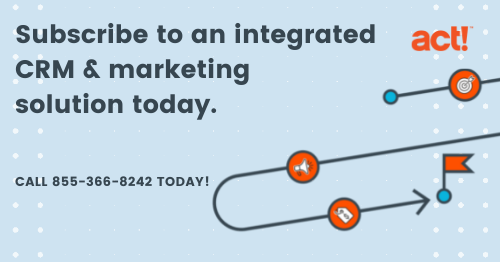
CRM and email marketing are two of the most important tools in any business arsenal, and when integrated, they provide numerous benefits to both small and large businesses. However, many companies are still using multiple, separate tools to manage their sales and marketing efforts. This leads to a disconnect between the two functions and causes decreased productivity, lead generation, customer engagement, and ultimately, sales conversions. Much of this can be overcome by integrating your CRM and email marketing tools.
Combining these powerful tools will enable you to:
- Gain a holistic view of each customer relationship
- Keep your lists and data in sync at all times
- Turn marketing engagement into sales actions
- Improve sales and marketing collaboration
- Experience increased convenience & visibility
Click here to view an infographic highlighting these benefits.
1. Gain a holistic view of each customer relationship
CRM and email marketing automation platforms work toward the same goal: to build stronger and more meaningful relationships with prospects and customers by improving interactions with them. But, it’s important to note, CRM and email marketing platforms facilitate different types of interactions with prospects and customers at very different stages in the sales cycle. And, if your platforms aren’t integrated, it’s hard to know which interactions have already been experienced with another team member and what the next steps should be. This can lead to redundant conversations, miscommunication, overall feelings of frustration, and even lost sales.
Integrating CRM and email marketing allows you to see real-time results from marketing campaigns within customer records to gain a deeper understanding of your customers’ behaviors, as both sales and marketing interactions are tracked together in one place. Since all customer activity is tracked in the software, marketers can gain valuable and real-time insights into their behavior.
2. Keep your lists and data in sync at all times
With integrated CRM and email marketing, you’ll never have to worry about information being out of sync across two different platforms again.
If your CRM and email marketing platforms aren’t integrated, you’re likely spending time toggling between different data sets of similar contacts, opportunities and accounts. Anyone working to maintain multiple lists can tell you how time-consuming and frustrating lost or mismatched datasets can be.
Integrated CRM and email marketing platforms share data ensuring that information is consistent for all teams and systems. This saves time, money and leads as information is organized and shared, and therefore, easier to manage, analyze and update.
3. Turn marketing engagement into sales actions
Integration optimizes customer relationships by centralizing customer data for all of your team members. This allows you to prioritize and easily track prospects during the sales cycle and ensure that the correct people are alerted to provide the best interactions at exactly the right times. This personalization optimizes customer engagement and makes them feel valued and understood.
For example, you can improve conversion rates by using shared data from email marketing to trigger a rapid follow-up on a hot lead; perhaps someone who signs up for a free trial or downloads your e-books and templates. You can increase sales by easily creating a workflow and actions based on conditions you define and help salespeople better tailor their interactions with leads, rather than lose time exporting and importing lists and letting opportunities pass them by.
4. Improve sales and marketing collaboration
Sales often looks to marketing for qualified leads, meaning prospects who are primed and ready to have discussions around making a purchase. An integrated CRM and email marketing platform helps to improve lead quality by ensuring properly nurtured or primed, qualified leads are transferred to sales at the appropriate time in the customer journey.
In 2020, 80% of companies saw an increase in leads and Business2Community reported an average increase in marketing-qualified leads of 451% due to automating touchpoints along the customer journey. This automation reduces marketers’ workloads and allows them to increase their focus on nurturing leads and specifically targeting strong sales leads.

For example, when you deploy lead capture forms on your website and landing pages, you instantly create new prospect records in your database – primed and ready for automatically-scheduled follow-up actions or nurture campaigns that you have created in your emarketing software. With an integrated system, these lead capture forms are captured in your customer relationship management software and passed onto sales for follow-up. Sales teams can then leverage the data from analyzing marketing lead behaviors to understand and sync contacts with web browsing habits, email click-throughs, and content downloads.
Each of these actions can be translated into marketing reports inside your CRM platform. Your sales team can then use the information in these reports to appeal to a prospect’s interests, pain points, and motivations during sales conversations.
Additionally, it’s important that all departments collaborate to develop sales and marketing strategies to turn prospects into customers to fuel the sales cycle. Integrating your CRM and email marketing platforms allows each functional area to have the appropriate input and accountability for its responsibilities. A shared platform ensures everyone is updated in real-time on each other’s recent activity and makes it easier for team members to step in and engage with potential customers at important pre-determined touchpoints. Integrated systems enable both teams to work together and achieve higher success rates.
5. Experience increased convenience & visibility
Integrating your CRM and email marketing is a more affordable way to streamline your workday, reduce management burden, and lower learning hurdles when compared to managing multiple, expensive, and complicated software solutions.
Integration also allows you to effectively analyze results and measure performance to improve your internal processes and sales and marketing tactics. Individually, each application can provide measurements around its given function, but an integrated CRM and email marketing platform enables you to analyze combined marketing and sales data to determine impact, areas for improvement and fine-tune strategies.
Integrating CRM with email marketing lets businesses identify each stakeholder’s and department’s successes and failures with centralized, consistent, and accurate performance reports.






